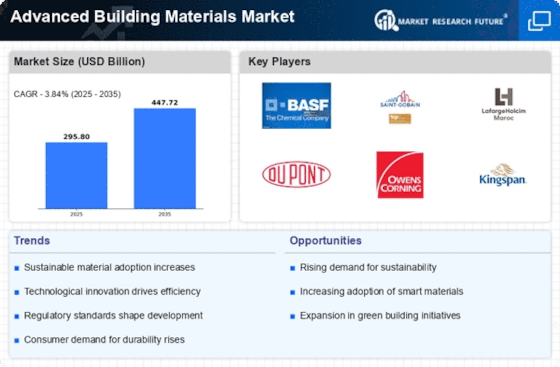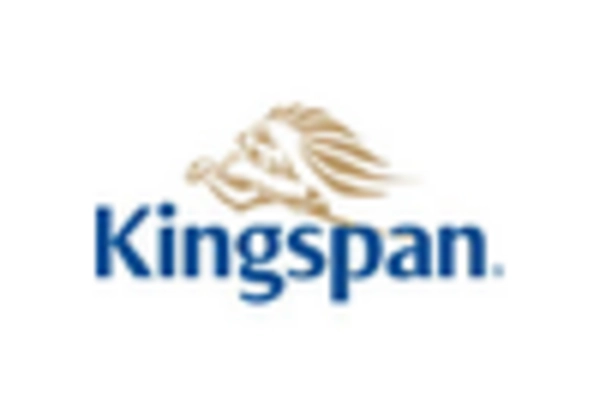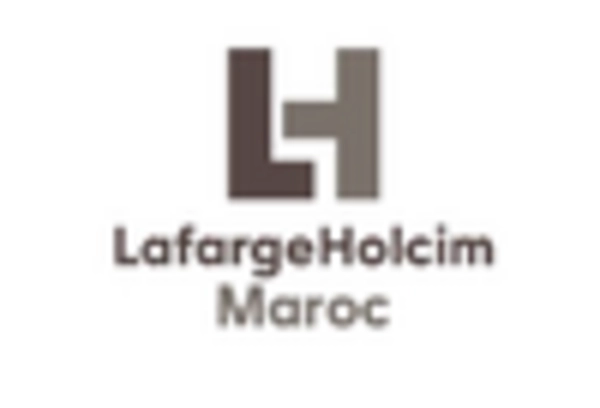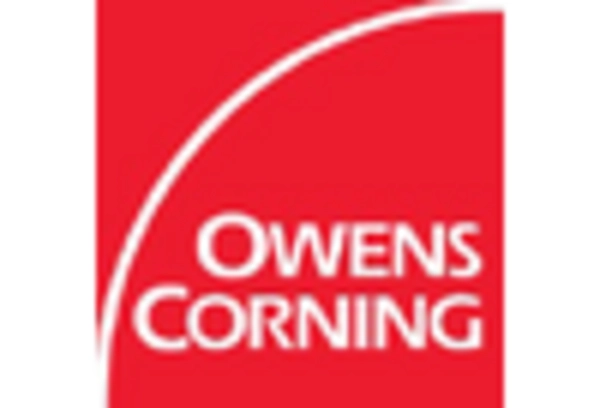Concrete
Glass
Insulation
Metals
Wood
Structural
Thermal
Acoustic
Waterproofing
Fire-Resistant
Residential
Commercial
Industrial
Infrastructure
Roofing
Flooring
Walls
Facades
Doors and Windows
North America
Europe
South America
Asia Pacific
Middle East and Africa
North America Outlook (USD Billion, 2019-2032)
North America Advanced Building Materials Market by Material Type
Concrete
Glass
Insulation
Metals
Wood
North America Advanced Building Materials Market by Functionality Type
Structural
Thermal
Acoustic
Waterproofing
Fire-Resistant
North America Advanced Building Materials Market by End Use Type
Residential
Commercial
Industrial
Infrastructure
North America Advanced Building Materials Market by Application Type
Roofing
Flooring
Walls
Facades
Doors and Windows
North America Advanced Building Materials Market by Regional Type
US
Canada
US Outlook (USD Billion, 2019-2032)
US Advanced Building Materials Market by Material Type
Concrete
Glass
Insulation
Metals
Wood
US Advanced Building Materials Market by Functionality Type
Structural
Thermal
Acoustic
Waterproofing
Fire-Resistant
US Advanced Building Materials Market by End Use Type
Residential
Commercial
Industrial
Infrastructure
US Advanced Building Materials Market by Application Type
Roofing
Flooring
Walls
Facades
Doors and Windows
CANADA Outlook (USD Billion, 2019-2032)
CANADA Advanced Building Materials Market by Material Type
Concrete
Glass
Insulation
Metals
Wood
CANADA Advanced Building Materials Market by Functionality Type
Structural
Thermal
Acoustic
Waterproofing
Fire-Resistant
CANADA Advanced Building Materials Market by End Use Type
Residential
Commercial
Industrial
Infrastructure
CANADA Advanced Building Materials Market by Application Type
Roofing
Flooring
Walls
Facades
Doors and Windows
Europe Outlook (USD Billion, 2019-2032)
Europe Advanced Building Materials Market by Material Type
Concrete
Glass
Insulation
Metals
Wood
Europe Advanced Building Materials Market by Functionality Type
Structural
Thermal
Acoustic
Waterproofing
Fire-Resistant
Europe Advanced Building Materials Market by End Use Type
Residential
Commercial
Industrial
Infrastructure
Europe Advanced Building Materials Market by Application Type
Roofing
Flooring
Walls
Facades
Doors and Windows
Europe Advanced Building Materials Market by Regional Type
Germany
UK
France
Russia
Italy
Spain
Rest of Europe
GERMANY Outlook (USD Billion, 2019-2032)
GERMANY Advanced Building Materials Market by Material Type
Concrete
Glass
Insulation
Metals
Wood
GERMANY Advanced Building Materials Market by Functionality Type
Structural
Thermal
Acoustic
Waterproofing
Fire-Resistant
GERMANY Advanced Building Materials Market by End Use Type
Residential
Commercial
Industrial
Infrastructure
GERMANY Advanced Building Materials Market by Application Type
Roofing
Flooring
Walls
Facades
Doors and Windows
UK Outlook (USD Billion, 2019-2032)
UK Advanced Building Materials Market by Material Type
Concrete
Glass
Insulation
Metals
Wood
UK Advanced Building Materials Market by Functionality Type
Structural
Thermal
Acoustic
Waterproofing
Fire-Resistant
UK Advanced Building Materials Market by End Use Type
Residential
Commercial
Industrial
Infrastructure
UK Advanced Building Materials Market by Application Type
Roofing
Flooring
Walls
Facades
Doors and Windows
FRANCE Outlook (USD Billion, 2019-2032)
FRANCE Advanced Building Materials Market by Material Type
Concrete
Glass
Insulation
Metals
Wood
FRANCE Advanced Building Materials Market by Functionality Type
Structural
Thermal
Acoustic
Waterproofing
Fire-Resistant
FRANCE Advanced Building Materials Market by End Use Type
Residential
Commercial
Industrial
Infrastructure
FRANCE Advanced Building Materials Market by Application Type
Roofing
Flooring
Walls
Facades
Doors and Windows
RUSSIA Outlook (USD Billion, 2019-2032)
RUSSIA Advanced Building Materials Market by Material Type
Concrete
Glass
Insulation
Metals
Wood
RUSSIA Advanced Building Materials Market by Functionality Type
Structural
Thermal
Acoustic
Waterproofing
Fire-Resistant
RUSSIA Advanced Building Materials Market by End Use Type
Residential
Commercial
Industrial
Infrastructure
RUSSIA Advanced Building Materials Market by Application Type
Roofing
Flooring
Walls
Facades
Doors and Windows
ITALY Outlook (USD Billion, 2019-2032)
ITALY Advanced Building Materials Market by Material Type
Concrete
Glass
Insulation
Metals
Wood
ITALY Advanced Building Materials Market by Functionality Type
Structural
Thermal
Acoustic
Waterproofing
Fire-Resistant
ITALY Advanced Building Materials Market by End Use Type
Residential
Commercial
Industrial
Infrastructure
ITALY Advanced Building Materials Market by Application Type
Roofing
Flooring
Walls
Facades
Doors and Windows
SPAIN Outlook (USD Billion, 2019-2032)
SPAIN Advanced Building Materials Market by Material Type
Concrete
Glass
Insulation
Metals
Wood
SPAIN Advanced Building Materials Market by Functionality Type
Structural
Thermal
Acoustic
Waterproofing
Fire-Resistant
SPAIN Advanced Building Materials Market by End Use Type
Residential
Commercial
Industrial
Infrastructure
SPAIN Advanced Building Materials Market by Application Type
Roofing
Flooring
Walls
Facades
Doors and Windows
REST OF EUROPE Outlook (USD Billion, 2019-2032)
REST OF EUROPE Advanced Building Materials Market by Material Type
Concrete
Glass
Insulation
Metals
Wood
REST OF EUROPE Advanced Building Materials Market by Functionality Type
Structural
Thermal
Acoustic
Waterproofing
Fire-Resistant
REST OF EUROPE Advanced Building Materials Market by End Use Type
Residential
Commercial
Industrial
Infrastructure
REST OF EUROPE Advanced Building Materials Market by Application Type
Roofing
Flooring
Walls
Facades
Doors and Windows
APAC Outlook (USD Billion, 2019-2032)
APAC Advanced Building Materials Market by Material Type
Concrete
Glass
Insulation
Metals
Wood
APAC Advanced Building Materials Market by Functionality Type
Structural
Thermal
Acoustic
Waterproofing
Fire-Resistant
APAC Advanced Building Materials Market by End Use Type
Residential
Commercial
Industrial
Infrastructure
APAC Advanced Building Materials Market by Application Type
Roofing
Flooring
Walls
Facades
Doors and Windows
APAC Advanced Building Materials Market by Regional Type
China
India
Japan
South Korea
Malaysia
Thailand
Indonesia
Rest of APAC
CHINA Outlook (USD Billion, 2019-2032)
CHINA Advanced Building Materials Market by Material Type
Concrete
Glass
Insulation
Metals
Wood
CHINA Advanced Building Materials Market by Functionality Type
Structural
Thermal
Acoustic
Waterproofing
Fire-Resistant
CHINA Advanced Building Materials Market by End Use Type
Residential
Commercial
Industrial
Infrastructure
CHINA Advanced Building Materials Market by Application Type
Roofing
Flooring
Walls
Facades
Doors and Windows
INDIA Outlook (USD Billion, 2019-2032)
INDIA Advanced Building Materials Market by Material Type
Concrete
Glass
Insulation
Metals
Wood
INDIA Advanced Building Materials Market by Functionality Type
Structural
Thermal
Acoustic
Waterproofing
Fire-Resistant
INDIA Advanced Building Materials Market by End Use Type
Residential
Commercial
Industrial
Infrastructure
INDIA Advanced Building Materials Market by Application Type
Roofing
Flooring
Walls
Facades
Doors and Windows
JAPAN Outlook (USD Billion, 2019-2032)
JAPAN Advanced Building Materials Market by Material Type
Concrete
Glass
Insulation
Metals
Wood
JAPAN Advanced Building Materials Market by Functionality Type
Structural
Thermal
Acoustic
Waterproofing
Fire-Resistant
JAPAN Advanced Building Materials Market by End Use Type
Residential
Commercial
Industrial
Infrastructure
JAPAN Advanced Building Materials Market by Application Type
Roofing
Flooring
Walls
Facades
Doors and Windows
SOUTH KOREA Outlook (USD Billion, 2019-2032)
SOUTH KOREA Advanced Building Materials Market by Material Type
Concrete
Glass
Insulation
Metals
Wood
SOUTH KOREA Advanced Building Materials Market by Functionality Type
Structural
Thermal
Acoustic
Waterproofing
Fire-Resistant
SOUTH KOREA Advanced Building Materials Market by End Use Type
Residential
Commercial
Industrial
Infrastructure
SOUTH KOREA Advanced Building Materials Market by Application Type
Roofing
Flooring
Walls
Facades
Doors and Windows
MALAYSIA Outlook (USD Billion, 2019-2032)
MALAYSIA Advanced Building Materials Market by Material Type
Concrete
Glass
Insulation
Metals
Wood
MALAYSIA Advanced Building Materials Market by Functionality Type
Structural
Thermal
Acoustic
Waterproofing
Fire-Resistant
MALAYSIA Advanced Building Materials Market by End Use Type
Residential
Commercial
Industrial
Infrastructure
MALAYSIA Advanced Building Materials Market by Application Type
Roofing
Flooring
Walls
Facades
Doors and Windows
THAILAND Outlook (USD Billion, 2019-2032)
THAILAND Advanced Building Materials Market by Material Type
Concrete
Glass
Insulation
Metals
Wood
THAILAND Advanced Building Materials Market by Functionality Type
Structural
Thermal
Acoustic
Waterproofing
Fire-Resistant
THAILAND Advanced Building Materials Market by End Use Type
Residential
Commercial
Industrial
Infrastructure
THAILAND Advanced Building Materials Market by Application Type
Roofing
Flooring
Walls
Facades
Doors and Windows
INDONESIA Outlook (USD Billion, 2019-2032)
INDONESIA Advanced Building Materials Market by Material Type
Concrete
Glass
Insulation
Metals
Wood
INDONESIA Advanced Building Materials Market by Functionality Type
Structural
Thermal
Acoustic
Waterproofing
Fire-Resistant
INDONESIA Advanced Building Materials Market by End Use Type
Residential
Commercial
Industrial
Infrastructure
INDONESIA Advanced Building Materials Market by Application Type
Roofing
Flooring
Walls
Facades
Doors and Windows
REST OF APAC Outlook (USD Billion, 2019-2032)
REST OF APAC Advanced Building Materials Market by Material Type
Concrete
Glass
Insulation
Metals
Wood
REST OF APAC Advanced Building Materials Market by Functionality Type
Structural
Thermal
Acoustic
Waterproofing
Fire-Resistant
REST OF APAC Advanced Building Materials Market by End Use Type
Residential
Commercial
Industrial
Infrastructure
REST OF APAC Advanced Building Materials Market by Application Type
Roofing
Flooring
Walls
Facades
Doors and Windows
South America Outlook (USD Billion, 2019-2032)
South America Advanced Building Materials Market by Material Type
Concrete
Glass
Insulation
Metals
Wood
South America Advanced Building Materials Market by Functionality Type
Structural
Thermal
Acoustic
Waterproofing
Fire-Resistant
South America Advanced Building Materials Market by End Use Type
Residential
Commercial
Industrial
Infrastructure
South America Advanced Building Materials Market by Application Type
Roofing
Flooring
Walls
Facades
Doors and Windows
South America Advanced Building Materials Market by Regional Type
Brazil
Mexico
Argentina
Rest of South America
BRAZIL Outlook (USD Billion, 2019-2032)
BRAZIL Advanced Building Materials Market by Material Type
Concrete
Glass
Insulation
Metals
Wood
BRAZIL Advanced Building Materials Market by Functionality Type
Structural
Thermal
Acoustic
Waterproofing
Fire-Resistant
BRAZIL Advanced Building Materials Market by End Use Type
Residential
Commercial
Industrial
Infrastructure
BRAZIL Advanced Building Materials Market by Application Type
Roofing
Flooring
Walls
Facades
Doors and Windows
MEXICO Outlook (USD Billion, 2019-2032)
MEXICO Advanced Building Materials Market by Material Type
Concrete
Glass
Insulation
Metals
Wood
MEXICO Advanced Building Materials Market by Functionality Type
Structural
Thermal
Acoustic
Waterproofing
Fire-Resistant
MEXICO Advanced Building Materials Market by End Use Type
Residential
Commercial
Industrial
Infrastructure
MEXICO Advanced Building Materials Market by Application Type
Roofing
Flooring
Walls
Facades
Doors and Windows
ARGENTINA Outlook (USD Billion, 2019-2032)
ARGENTINA Advanced Building Materials Market by Material Type
Concrete
Glass
Insulation
Metals
Wood
ARGENTINA Advanced Building Materials Market by Functionality Type
Structural
Thermal
Acoustic
Waterproofing
Fire-Resistant
ARGENTINA Advanced Building Materials Market by End Use Type
Residential
Commercial
Industrial
Infrastructure
ARGENTINA Advanced Building Materials Market by Application Type
Roofing
Flooring
Walls
Facades
Doors and Windows
REST OF SOUTH AMERICA Outlook (USD Billion, 2019-2032)
REST OF SOUTH AMERICA Advanced Building Materials Market by Material Type
Concrete
Glass
Insulation
Metals
Wood
REST OF SOUTH AMERICA Advanced Building Materials Market by Functionality Type
Structural
Thermal
Acoustic
Waterproofing
Fire-Resistant
REST OF SOUTH AMERICA Advanced Building Materials Market by End Use Type
Residential
Commercial
Industrial
Infrastructure
REST OF SOUTH AMERICA Advanced Building Materials Market by Application Type
Roofing
Flooring
Walls
Facades
Doors and Windows
MEA Outlook (USD Billion, 2019-2032)
MEA Advanced Building Materials Market by Material Type
Concrete
Glass
Insulation
Metals
Wood
MEA Advanced Building Materials Market by Functionality Type
Structural
Thermal
Acoustic
Waterproofing
Fire-Resistant
MEA Advanced Building Materials Market by End Use Type
Residential
Commercial
Industrial
Infrastructure
MEA Advanced Building Materials Market by Application Type
Roofing
Flooring
Walls
Facades
Doors and Windows
MEA Advanced Building Materials Market by Regional Type
GCC Countries
South Africa
Rest of MEA
GCC COUNTRIES Outlook (USD Billion, 2019-2032)
GCC COUNTRIES Advanced Building Materials Market by Material Type
Concrete
Glass
Insulation
Metals
Wood
GCC COUNTRIES Advanced Building Materials Market by Functionality Type
Structural
Thermal
Acoustic
Waterproofing
Fire-Resistant
GCC COUNTRIES Advanced Building Materials Market by End Use Type
Residential
Commercial
Industrial
Infrastructure
GCC COUNTRIES Advanced Building Materials Market by Application Type
Roofing
Flooring
Walls
Facades
Doors and Windows
SOUTH AFRICA Outlook (USD Billion, 2019-2032)
SOUTH AFRICA Advanced Building Materials Market by Material Type
Concrete
Glass
Insulation
Metals
Wood
SOUTH AFRICA Advanced Building Materials Market by Functionality Type
Structural
Thermal
Acoustic
Waterproofing
Fire-Resistant
SOUTH AFRICA Advanced Building Materials Market by End Use Type
Residential
Commercial
Industrial
Infrastructure
SOUTH AFRICA Advanced Building Materials Market by Application Type
Roofing
Flooring
Walls
Facades
Doors and Windows
REST OF MEA Outlook (USD Billion, 2019-2032)
REST OF MEA Advanced Building Materials Market by Material Type
Concrete
Glass
Insulation
Metals
Wood
REST OF MEA Advanced Building Materials Market by Functionality Type
Structural
Thermal
Acoustic
Waterproofing
Fire-Resistant
REST OF MEA Advanced Building Materials Market by End Use Type
Residential
Commercial
Industrial
Infrastructure
REST OF MEA Advanced Building Materials Market by Application Type
Roofing
Flooring
Walls
Facades
Doors and Windows


















Leave a Comment